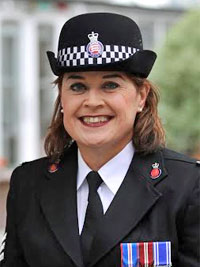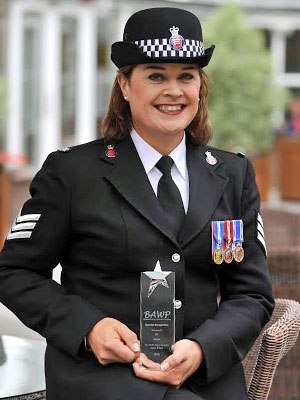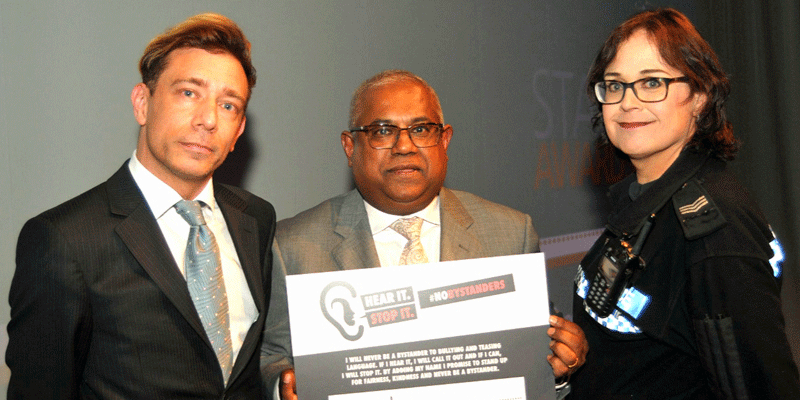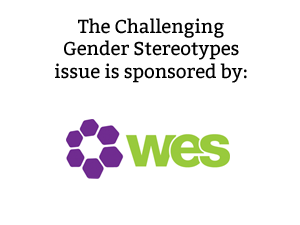Gina Denham is a sergeant with the Basildon Community Policing Team in Essex. She underwent gender reassignment after consulting with her GP and speaking to her team about wanting to live as a woman as living a double-life had begun to affect her mental health. Since then Gina has won an award to recognise the peer support she has provided to help others by sharing her story.

“…in December 2013 I woke up one day and simply realised I could not go on living a double-life – it was having a detrimental effect on my well-being. So I began the process of transitioning in 2014…”
Joining the police
I first joined the police in 1990 as a civilian, I had previously been self-employed as a cabinet maker, and had been travelling around the United States so I needed a job on my return. The civilian job was meant to be for two weeks and I have never looked back.
I volunteered as a special constable in 1991 and I became a police constable in 1993. In 2005 I passed the sergeants’ exam. I never really had positive experiences of the police as a young person, but by working at the police station it completely changed my point of view. I saw officers were human beings just doing a job, it made me realise that it could be the job for me. My negative experiences of my younger days form the bedrock of how I try to serve the public. My roles have mainly been in the community and problem solving area of policing. I do my best and it gives me job satisfaction when we get things right.
My role on a day to day basis
I supervise a team of police officers, and police community support officers. No day is ever the same. We respond to emerging crime or anti-social behaviour trends and do our best to support those in our community who could be the most vulnerable. With limited resources we sometimes get to do this by working with other agencies like Trading Standards or the local council. Working in this joined-up way helps us get the best result, by using the right people.
My gender reassignment journey
In 1998 whilst serving in the police I finally realised that the ‘thing’ I could never understand about myself and was so ashamed of was that I was transexual. I was referred to a psychiatrist who confirmed I was trans. I then got an appointment to go to the Gender Identity Clinic in London.
I felt that I was ready to transition. But I didn’t anticipate that some people would go to the press and, despite the fact that my wife, daughters and close family knew about me I was forced to tell relatives that did not really need to know. My world was turned upside down; I had no support, and was told not to talk about being trans because it made people feel uncomfortable and they did not want to hear about it.
For the sake of my family, I put away any thoughts of fully transitioning, and just got on with my life, transferring to Essex Police as a sergeant in 2007. In Essex Police I oversaw colleagues conducting ethical investigations into LGBTQ (lesbian, gay, bisexual, transgender and queer) hate crimes, and I was pleased to see they treated victims with respect and compassion. I confided again in a few colleagues that I was trans and they were supportive – many were aghast that I felt I could not be myself. It enabled me to reassess things – I considered that perhaps the world had moved on since coming out nine years earlier.
Over a period of time I confided in more colleagues and then in December 2013 I woke up one day and simply realised I could not go on living a double-life – it was having a detrimental effect on my well-being. So I began the process of transitioning in 2014. By November of that year I took a leap of faith by coming out officially for the second time in my life. I was nervous, but when I told Essex Police’s chief officers they were completely supportive, and in 2015 I began the process of taking hormones and testosterone blockers.
Seeing the good in people

As my transition has progressed I have seen the good in people both on and off duty, in colleagues, family, friends and the general public. This has enhanced my transition and made it an even more meaningful experience. I prejudged that people might have a problem with me based on my negative experiences years before, but I was so wrong.
Every day is generally pretty joyous – I love my life now, and seeing the best in people is really uplifting. I had my gender reassignment surgery in July and I can honestly say it’s the first time in my life I have actually felt comfortable in my own body. Such am amazing thing, which I guess can be taken for granted.
Support I’ve received from Essex Police
This time round, compared to the other police force I previously worked for, things have been so different. I have had so much support within Essex Police from my colleagues, bosses and chief officers – it has been incredible.
They have really been flexible and innovative, for example in the early stages of my transition I was living my life as a woman all the time off duty, but still presenting as a man at work. I asked if it was possible to have two warrant cards; one with a male photo and the other with a woman’s, which Essex Police readily agreed to. It was such a simple thing, but it really made a difference as there was no risk of me ‘outing’ myself by showing a male warrant card if I made an arrest off duty.
The support I’ve received has made a world of difference to my life. Being myself 24 hours a day, seven days a week is a joyous thing. I no longer live a double life, and when I reflect on my past I realise now how that stress of living a dual existence manifested itself in different ways. I was irritable and angry that I could not be myself.
How gender stereotyping affected me
Before I transitioned people would see a man in front of them which is not how I perceived my own gender, and I found that upsetting. Men would talk about football to me, assuming I knew all about it (which I don’t), and interestingly, I had a similar experience when I was among a group of women, who were talking about make-up. One looked across at me, and said, “You wouldn’t understand about this, you must find it pretty boring”, except in my head I was screaming – I knew exactly what they were talking about and was extremely interested.
It was years of similar experiences that made me want to transition. People were adopting a ‘typical mind’ in front of me, assuming so many things about me that just were not true. I really was trapped in the wrong body.
The best way to challenge gender stereotypes and how other employers can help

I’d suggest to people to not adopt what I call the ‘typical mind’, assuming your audience shares the same views or values as you. I guess we all do this in some way, but it can be a negative thing.
Employers can help to ensure their policies and procedures are fair to all genders, and certainly in the case of trans people consider non binary titles like ‘Mx’ in their HR systems, or perhaps consider gender neutral toilets. Simple things like this can make a world of difference and shows openness to change.
Next for me and Essex Police
I hope to continue in my role as well as helping trans people – both within the police service and outside of it – to realise that being trans is not a barrier. I’m hoping to retire in two years and I will be starting a counselling course in January 2017 which should lead to some more qualifications.
Being trans can be incredibly isolating, not just for the trans person, but their families and friends who may not know how best to support them. It really upsets me that people feel they have nowhere to turn, just like I did, and I intend to do all I can to give peer support to as many people as I can. Nobody deserves to feel isolated and I aim to stop it from happening.
https://www.essex.police.uk/your-area/basildon/
https://twitter.com/EssexPoliceUK
https://twitter.com/sgtginadenham
https://www.facebook.com/EssexPoliceUK/
https://www.linkedin.com/company/essex-police






